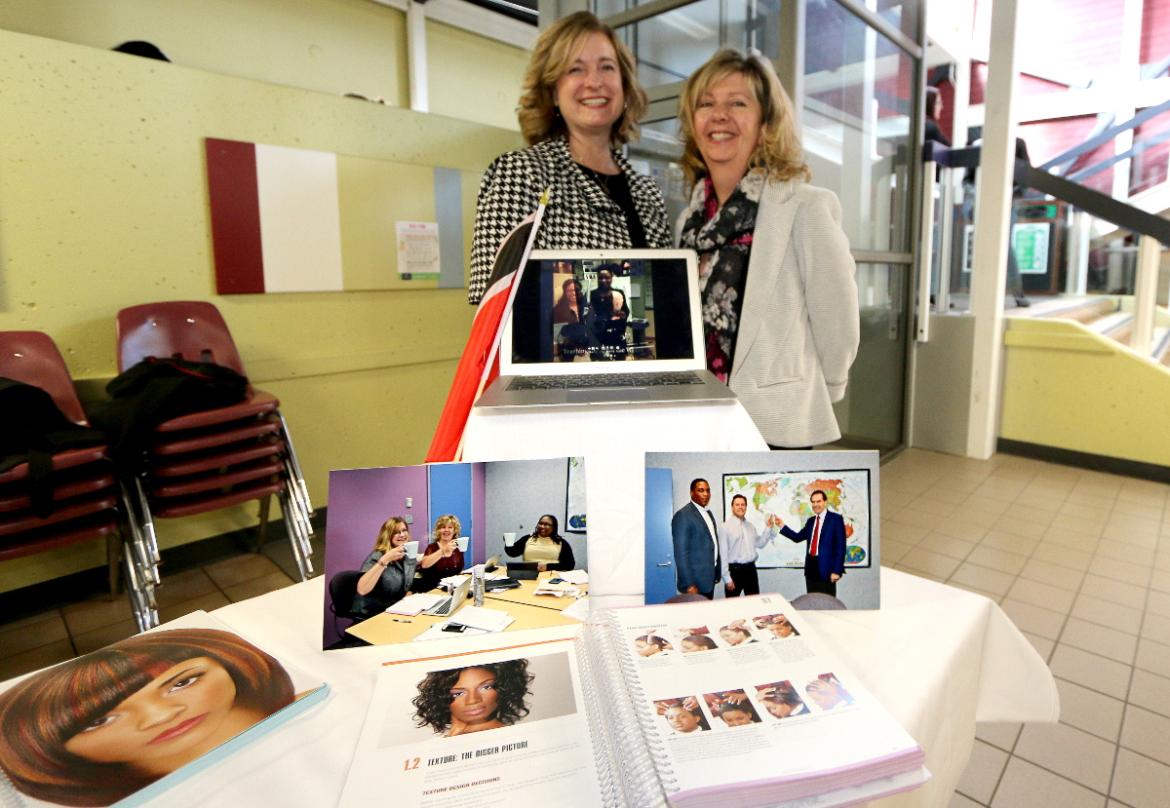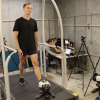
VIU Chair of the Esthetics Program, Lesley Osborne (left), and Hairdressing Program Chair, Sally Vinden, visited with students during International Development Week, which was held at the Nanaimo Campus Feb. 1-5. Vinden is looking at developing tools so trades trainers can prepare students for the work environment of the future.
February 5, 2016 - 3:15pm
VIU Research and Scholarly Activity: Lunch and Learn with Sally Vinden
“Can you imagine holding an iPhone 6 in your hand 10 years ago? Back then, could you imagine what it was capable of?” asks Sally Vinden. “When we train people we have to be looking ahead to the next iPhone, because it’s always right around the corner.”
Vinden is currently the Vancouver Island University (VIU) Hairdressing Department Chair and program instructor. She is in the process of completing her doctoral thesis with Simon Fraser University. Called Constructing Vocational Knowledge, her thesis argues that Trades and Vocational Education and Training (TVET) must shift from strictly skill development to ensuring students have the capacity to learn and adapt to the rapid advancements in technology inherent in the 21st century workplace.
She recently presented her thesis work at the weekly VIU Research and Scholarly Activity department’s Lunch and Learn event, which are held to provide VIU faculty a public venue to share their work.
“As vocational instructors, how do we ensure the right workers are ready with the right skills at the right time? The economic health of British Columbia depends on having the right answers to these questions,” said Vinden.
She shared statistics from the BC Jobs Blueprint – a government plan looking at ways to maximize the potential of the existing workforce and the workforce of the future.
The Blueprint states that in less than 10 years there will be one million job openings in all sectors and in all parts of the province. Planning for that eventuality is something university, trades and college educators are taking seriously – especially considering the same report predicts eight out of 10 of those jobs will require some form of post-secondary education.
She says the fear is that the exponential rise of new technology is outpacing the ability of vocational instructors and programs to keep up.
“The traditional approach to trades training is more often designed to teach concrete skills than abstract learning, and it’s that reliance on competency based practice that must be looked at. We need to balance competency based practice with abstract learning,” said Vinden.
“I want to determine what approaches vocational instructors use to foster their student’s cognitive development within competency based teaching and learning models.”
To do that, she is preparing a case study that will rely on, among other things, the teaching approaches of 20 vocational instructors to determine the factors that inform their decision making.
“The results from my work will aim to provide new information for trades instructors and administration on how best to proceed with the professional development of vocational instructors. This insight may influence faculty development, program and curriculum design – and ultimately student learning outcomes.”
The VIU Research and Scholarly Activity department holds Lunch and Learn sessions on Tuesdays at the Nanaimo Campus and everyone is welcome to attend.
Media Contact: Dane Gibson, Communications Officer, Vancouver Island University
P: 250.740.6288 E: Communications@viu.ca
Tags: Research






